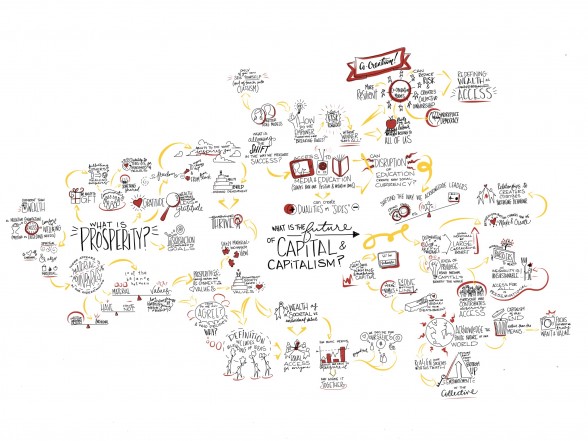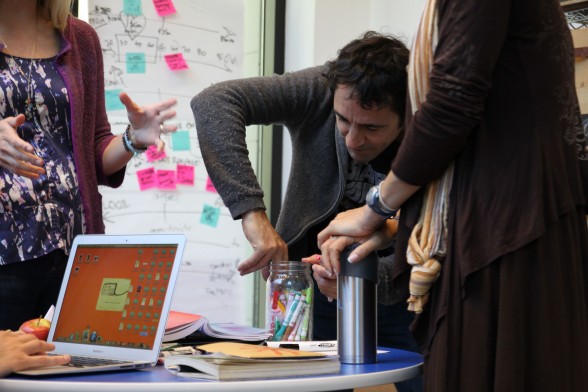The Coin to the Kingdom: Re-THNKing Capitalism as a Key to the Housing Crisis

Who will you meet?
Cities are innovating, companies are pivoting, and start-ups are growing. Like you, every urban practitioner has a remarkable story of insight and challenge from the past year.
Meet these peers and discuss the future of cities in the new Meeting of the Minds Executive Cohort Program. Replace boring virtual summits with facilitated, online, small-group discussions where you can make real connections with extraordinary, like-minded people.
According to provocateur and THNK alumni Michell Zappa, “an industry-toppling, government-shifting, sector-disrupting revolution is underway. Think Napster, but bigger.” You’ve probably felt the undercurrents. Yet as economic waves rock the boat of capitalism, many are unprepared for what’s next. Excitement and fear mix as so-called sharing economies, shifts in philanthropy and alternative currencies emerge, balancing possibilities with the untested nature of new models. Capitalism as we know it, even money itself, is one of the most complex systems mankind has ever created. And part of the problem we face, as our world is bending and breaking, is how to describe the relationships between systems – they are nested, intertwined, interdependent, and deeply emergent. From a cultural and emotional perspective, we sense the inadequacy of our financial systems but often feel powerless to change something that feels monstrous and unshakable, yet everywhere we turn our attention to we can find signs of change.
So, in my role as the Director of the Challenge track at THNK’s newly launched Vancouver campus, I couldn’t wait to dive into examining the Future of Capital(ism). THNK School of Creative Leadership is a C School that combines venture design and innovation leadership and focuses on action and implementation. We take the best from business schools and design schools to create a greater sum: truly transformational creative leadership to build human-centered systems for a better future. Within this journey, the Challenge is a 6-month effort that takes a humble, curious, and forward-looking cohort, a global network with a shared intention for impact, and trains them in a structured approach to human-centered creativity using a topic of deep societal relevance.
Envisioning a Better Future and Orchestrating Creative Teams
We begin by co-creating a moonshot vision to align our efforts and help us determine some of the most promising areas for exploration. We tap into a diverse ecosystem, inviting subject matter experts, rabble rousers, and master practitioners to roll up their sleeves – an incredible group rallied around the Future of Capitalism, out of which emerged our Innovation Partners on this initial challenge cycle: the City of Vancouver and the Digital Finance Institute. These partners bring a rich depth of knowledge, broad networks that can be harnessed, and platforms for rolling out concepts with promise. They collaborated on shaping the brief and, after much deliberation, we decided to use the Vancouver housing market as a petri dish for discovery, asking “how might alternative and digital currencies increase access to affordable low-carbon housing for those in need?”. The profound ripple effects from the current housing crisis are being felt well beyond Vancouver, and the aim with all of our Innovation Challenge work is to use a local context to drive global learnings.
With teams that sound like they could have been the set-up to a bad joke (an accountant, a restaurateur, and a creative director walk into a leadership school…), the cohort examined the needs of varied demographics, from vulnerable populations to mid-to-low income families. They interrogated data around perceptions of “green” housing options, changing patterns of ownership and engagement with living spaces – from co-housing to nomadic living – and the impact these shifts are having on property development. Participants from around the globe tore apart existing financial vehicles tied to earning equity in housing, models of developing and recouping energy upgrades, and assumptions underpinning ideas of community development – from the potential of smart multi-generational housing blocks to how community assets are often undervalued. The outcomes of this process are a first step towards driving breakthrough change and fashioning a future of capitalism predicated on the belief that “we’re all better off when we’re all better off,” as THNK Forum Guest, Eric Liu, so plainly remarked.
Turning One Small Step into One Giant Leap
During the next several years, across 6-month program cycles in Vancouver and Amsterdam, THNK is uniquely positioned to continue convening diverse groups of changemakers around examining, reframing, and driving societal impact. But impact is more likely when we join forces with exceptional Innovation Partners to drive new thinking around how we can become positive participants in the marketplace by harnessing the technological and complex dynamic cultural forces shaping these systems. While growing disparities in income and access cause global upheaval and strife, we see the renewed focus on our interdependent financial future as a massive opportunity for those bold enough to dive in. As encouraged as I am by the team triumphs, concepts and momentum, this is but a first milestone in service of a much larger vision – catalyzing this kind of change requires commitment, support, and evangelists. We and our Partners and Participants are in for the long-haul, and we hope you’ll join us!
Find out more about what we’ve discovered around how fintech and alternative financial models are impacting urban landscapes and providing surprising hope for global communities at our Digital Finance, Alternative Currencies and Housing in Vancouver panel at 2:25pm on Thursday, October 22nd at Meeting of the Minds (or check out the live webcast).
Discussion
Leave your comment below, or reply to others.
Please note that this comment section is for thoughtful, on-topic discussions. Admin approval is required for all comments. Your comment may be edited if it contains grammatical errors. Low effort, self-promotional, or impolite comments will be deleted.
1 Comment
Submit a Comment
Read more from MeetingoftheMinds.org
Spotlighting innovations in urban sustainability and connected technology
Middle-Mile Networks: The Middleman of Internet Connectivity
The development of public, open-access middle mile infrastructure can expand internet networks closer to unserved and underserved communities while offering equal opportunity for ISPs to link cost effectively to last mile infrastructure. This strategy would connect more Americans to high-speed internet while also driving down prices by increasing competition among local ISPs.
In addition to potentially helping narrow the digital divide, middle mile infrastructure would also provide backup options for networks if one connection pathway fails, and it would help support regional economic development by connecting businesses.
Wildfire Risk Reduction: Connecting the Dots
One of the most visceral manifestations of the combined problems of urbanization and climate change are the enormous wildfires that engulf areas of the American West. Fire behavior itself is now changing. Over 120 years of well-intentioned fire suppression have created huge reserves of fuel which, when combined with warmer temperatures and drought-dried landscapes, create unstoppable fires that spread with extreme speed, jump fire-breaks, level entire towns, take lives and destroy hundreds of thousands of acres, even in landscapes that are conditioned to employ fire as part of their reproductive cycle.
ARISE-US recently held a very successful symposium, “Wildfire Risk Reduction – Connecting the Dots” for wildfire stakeholders – insurers, US Forest Service, engineers, fire awareness NGOs and others – to discuss the issues and their possible solutions. This article sets out some of the major points to emerge.
Innovating Our Way Out of Crisis
Whether deep freezes in Texas, wildfires in California, hurricanes along the Gulf Coast, or any other calamity, our innovations today will build the reliable, resilient, equitable, and prosperous grid tomorrow. Innovation, in short, combines the dream of what’s possible with the pragmatism of what’s practical. That’s the big-idea, hard-reality approach that helped transform Texas into the world’s energy powerhouse — from oil and gas to zero-emissions wind, sun, and, soon, geothermal.
It’s time to make the production and consumption of energy faster, smarter, cleaner, more resilient, and more efficient. Business leaders, political leaders, the energy sector, and savvy citizens have the power to put investment and practices in place that support a robust energy innovation ecosystem. So, saddle up.








:-)